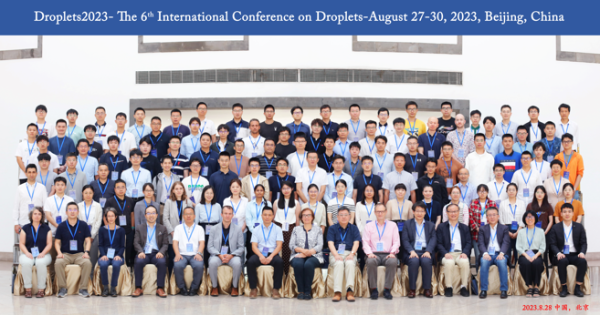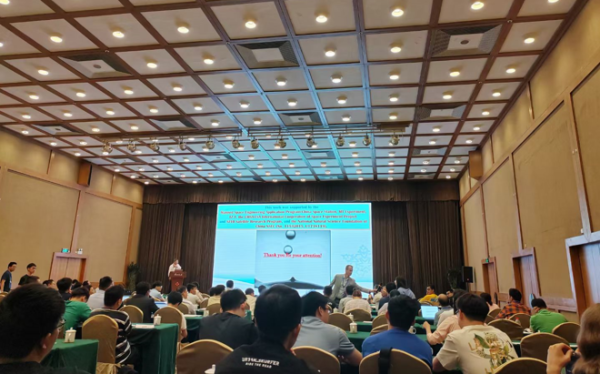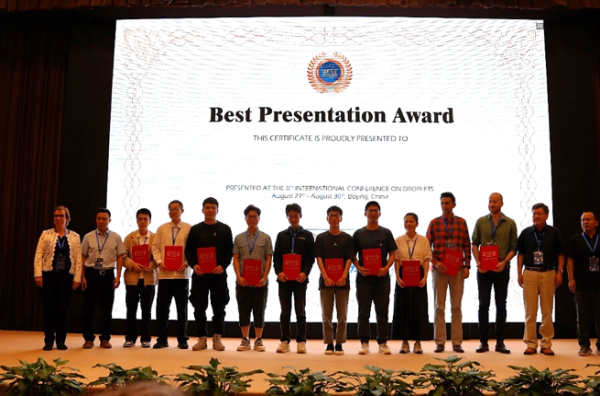Recently, the 6th International Conference on Droplets was successfully held in Beijing. The conference was jointly organised by the Institute of Mechanics, Chinese Academy of Sciences, Beijing University of Aeronautics and Astronautics and Tsinghua University, and co-organised by the Chinese Society of Mechanics. The conference was co-chaired by Professor Liu Qiusheng of the Institute of Mechanics, Professor Wen Dongsheng of the Beijing University of Aeronautics and Astronautics, and Professor Sun Chao of Tsinghua University. Over 130 professionals and academics from over ten countries, such as China, the USA, Germany, the UK, Japan, Singapore, India, etc., travelled to Beijing to attend the meeting.
The Droplet Conference began in Marseille, France in 2013 and has successfully held five series of conferences in Europe and the United States. This is the first time it is being held in China. The conference concentrates on sharing research findings in various fields, including gas-liquid interfaces, droplets, bubbles, complex fluids, infiltration, and contact behavior. Moreover, research on interfacial processes, as well as fluid phase transformation and heat characteristics in two-phase systems in space and experimental research, is also included. The topics encompass chemical industry, materials preparation, and micro- and nano-fluid systems. The conference will also cover subjects such as droplet impact, phase transition processes, complex interfaces, wetting behaviour, electro-magnetic fluids, 3D printing, smart manufacturing, microfluidics, biological and medical applications, alongside various other well-liked areas.
The conference will showcase Professor Doris Vollmer from the Max Planck Institute in Germany, Guo Liejin, an Academician of the Chinese Academy of Sciences, Professor David A. Weitz from Harvard University in the USA, Professor Eberhard Bodenschatz from the Max Planck Institute in Germany, Professor Omar Matar from the Imperial College in the UK, Professor Kathleen Stebe from the University of Pennsylvania, and Professor Eberhard Bodenschatz from the Paris Institute for Scientific Research in France. and Professor Kathleen Stebe from the University of Pennsylvania, Professor David Quéré from University of Paris, Professor Wang Drongkai from Hong Kong Polytechnic University, and Professor Andrew Bayly from the University of Leeds have conducted research on the properties of surfaces and interfaces. They have discovered that surface tension can be used to control how liquids behave on solid surfaces. By altering the surface tension, they can manipulate the liquid to spread or retract. This finding has promising applications in fields such as microfluidics and soft robotics. Professor Lv Cunjing from Tsinghua University, Professor Fei Duan from Nanyang Technological University (Singapore), Professor David Brutin from the Université de Marseille (France), and researcher Liu Qiusheng from the Institute of Mechanics. Over ten well-known experts, such as Professor Lv Cunjing from Nanyang Technological University of Singapore, Professor David Brutin from the University of Marseille in France, and researcher Liu Qiusheng from the Institute of Mechanics, gave 17 presentations at the main venue. They were shared online and offline. During the three-day report period, Liu Qiusheng, who works at the Institute, was asked to present the recent advancements of the newly initiated human spaceflight project, including its on-orbit operation. Concurrently, three meetings were held, and a sum of 83 verbal reports were performed.
Ten students and five young scholars were awarded the Best Presentation Award by the International Scientific Committee, which was announced by Prof Doris Vollmer, Chair of the Droplet Series, and presented with certificates at the closing ceremony.
The conference's triumph had a beneficial impact on boosting the academic exchange and cooperation among scholars from China and overseas. The participants introduced their newest research findings and applications relating to assorted disciplines and engaged in constructive dialogues on difficult topics. Through discussions and collaborations, they gained a better comprehension of the latest developments in international droplets, broadened their perspectives, and enhanced their academic abilities.
The conference has formed reliable partnerships and friendships to advance future scientific and academic exchanges. The International Scientific Committee on Droplets has decided that Belgium will host the next Droplet Conference in 2025.


